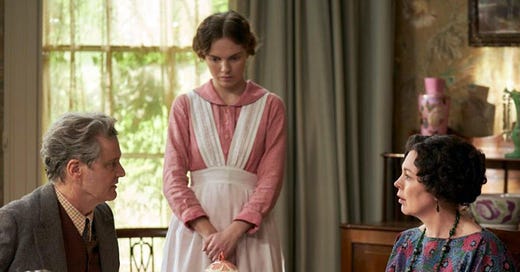Mothering Sunday
This lyrical, sensuous story gives us a portrait of an orphaned servant whose secret romance with a rich family's son pushes her to express herself and grow into something more.
“Mothering Sunday” is as sensuous a film as I’ve seen in awhile.
Many people take “sensuous” to mean “sexual,” and indeed there’s quite a bit of sex and nudity in this British film about a servant girl carrying on an affair with a rich family’s son.
But that’s not what I mean.
Director Eva Husson lavishes her camera across her subjects, picking out little details and then floating our gaze over to something else. We go on voyeuristic jaunts that indulge in an unabashedly pleasurable way. She’ll focus on the tail of a coat flapping in the breeze while the person rides a bike, or linger over lips puffing on a cigarette with a carnal feel that’s positively electric.
This gorgeous, lyrical film is set (mostly) on Mother’s Day in 1924, a rare holiday for Jane Fairchild (Odesssa Young), a servant girl working for the wealthy Nivens family. She has secretly been carrying on an affair with Paul (Josh O’Connor), the son of the neighboring Sherringhams, and they use the time for an assignation at his mansion while his parents lunch with the Nivens.
The screenplay by Alice Birch subtly shuffles forward and backward in time without any sort of cues, so we’ll track back to Paul and Jane’s first meeting, then years later to her marriage to Donald (Sope Dirisu), a sensitive philosopher. There are also glimpses even further to her as an old woman, played by the great Glenda Jackson (in her first film appearance in three decades).
This is not a great surprise, as Paul and Jane both know their romance is fleeting. She is an orphaned girl who went into domestic service at age 14, while he is expected to become a lawyer, marry a woman of his own station — Emma Hobday (Emma D'Arcy) — have children and carry on the family name.
He calls her “my one true friend,” and it is only to Jane that he reveals his innermost feelings and conflicts about his obligations. Both of his older brothers died in World War I. The Nivens’ own sons, Phillip and James, also perished after all the children growing up together. So in a way he is their son, too.
Young and O’Connor make for a beautiful couple, though not in a traditional way. Paul is a bit stooped and horsey-faced, and has a sort of gentle teasing about his manner. With her wide face and piercing green eyess, offset by a slightly crooked smile, Jane can seem both very timid and brazen.
Mr. and Mrs. Niven are played by Colin Firth and Olivia Colman, who stay very much in the background for the first half of the movie. It’s unusual to have world-class, Oscar-winning thespians in such seemingly thin roles. But they become more pivotal in the last act, as tragedy visits upon these well-to-do families once again.
Mrs. Niven has essentially given up on life, her grief over her lost sons melting into a disdain for her husband, her social circle and virtually everything else. She sits at dressed-up gatherings, stewing in sadness and rage, which Colman transmits often without even saying a word.
Mr. Niven is kindly and diffident, and clearly regards Jane with a platonic affection, giving her money to enjoy the day off and acting more as a distant father figure than employer. He is bewildered by his wife’s withdrawal, and tries to make do in a very English stiff-upper-lip way.
Jane’s lack of parents on Mother’s Day is something that seems to bother everyone but her. At one point Mrs. Niven tells her she is blessed to have been “comprehensively bereaved at birth” — she has everything to gain, because she has nothing to lose. Jane has a keen mind and sneaks books out of the library to feed her intellectual craving, and begins to scribble out her own ideas.
After Paul leaves to join the lunch party, he invites Jane to linger around the Sherringham house. This she does, fingering his belongings as if to absorb the essence he has rubbed off on them. Her journey continues throughout the rest of the mansion, enjoying the freedom of such a large expanse she can call her own, if but temporarily.
She does not bother to put on her clothes for this trek. Rather than seeming lascivious, this reverie in the nude is a reflection of a rare moment of freedom and release in Jane’s life. No doubt she would be instantly fired if discovered there, or her romance with Paul ever came to light.
But Young gives Jane a growing sense of valor, rooted in the belief that this portion of her life, even with its challenges and brief glimpses of exhilaration, is but the beginning of something deeper and grander.
“Mothering Sunday” is based upon the novel by Graham Swift, unread by me. It has been marvelously translated here with a wonderful cast and period settings. Like Jane, Young seems destined for great things, reminding me of the early roles of Florence Pugh or Saoirse Ronan.
And director Husson and screenwriter Birch show a mature, sumptuous approach to filmmaking that borrows from various cinema traditions without seeming beholden to any of them. More, please.





